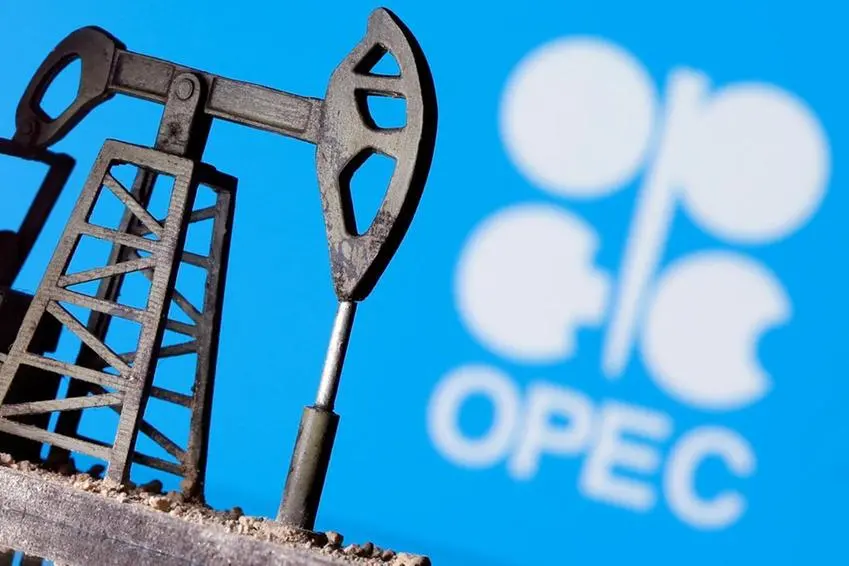PHOTO
It was clear that this year in the oil business was going to be anything but plane sailing when the price of US benchmark WTI dipped temporarily below zero, and OPEC+ — the alliance of OPEC member countries and 10 other producers led by Russia — agreed in April to make historic production cuts. The road toward balancing the markets may be bumpier than expected, and on Saturday oil was trading about 6 percent down on its August highs.
The Joint Ministerial Monitoring Committee (JMMC), co-chaired by the Saudi and Russian energy ministers Prince Abdul Aziz bin Salman and Alexander Novak, will meet on Monday to discuss compliance of OPEC+ members with the current production cuts of 7.7 million barrels per day.
According to S&P Global Platts, compliance in September was good: 101 percent for OPEC and 99 percent for OPEC+. Two of the laggards, Iraq and the UAE, over-complied by 70,000 bpd and 160,000 bpd, keeping their promises to compensate for previous overproduction. The third country that needs to make amends is Nigeria, which has overproduced from the word go and continued to do so in September, with compliance at 90 percent. In its defense, the pandemic made an already difficult economic outlook even more tenuous, and there are internal security demands too.
Further clouds are gathering. The coronavirus is resurgent, resulting in restrictions and partial lockdowns in Europe. The US has recorded more than 8 million cases, and India and Brazil are both finding it hard to come to grips with COVID-19. East Asia seems the only place showing partial success in combating it. Last week’s IMF economic forecast sets China’s economy apart from the world. While the global economy is forecast to contract by 4.3 percent, China’s is set to grow by 1.9 percent in 2020.
Lockdowns and shrinking GDP numbers are bad for demand. As if this were not enough, new supplies are hitting global oil markets. Libya’s eastern military commander Khalifa Haftar lifted the blockade on the country’s oil facilities, and production is reportedly back up to 500,000 bpd. Libya had produced 1.2 million bpd before January 2020, when hostilities all but halted production. Libya, Venezuela and Iran are exempt from the OPEC+ cuts, which means any incremental production is felt immediately.
As for Iran, a lot will depend on who wins November’s presidential election in the US. If Joe Biden becomes president, he will be eager to resume negotiations with Iran on the Joint Comprehensive Plan of Action, the 2015 deal to ease sanctions in return for Tehran’s curbing its nuclear program. President Donald Trump withdrew from the agreement and re-imposed sanctions, a process that Biden is likely to reverse.
Where does this leave the JMMC, which does not have the authority to set quotas, but rather monitors them? Given the current macroeconomic situation, compliance becomes all the more important. This was reflected in a telephone conversation between Russia’s President Vladimir Putin and Saudi Crown Prince Mohammed bin Salman, in which they urged countries to comply with the current production cuts; Saudi compliance in September was 100 percent, while Russia’s was 95 percent, an overproduction of close to 100,000 bpd.
Compliance can achieve a lot, but it may not be enough. The International Energy Agency’s monthly oil report shows stocks decreasing by 4 million bpd by the end of the year, but COVID-19 put a damper on the demand outlook. Furthermore, OPEC+ is scheduled to reduce its production cuts from 7.7. million bpd until December 2020 to 5.8 million bpd until April 2021. Increasing supply by that amount will have an effect on markets, especially if Libya resumes production at an accelerated pace.
For the time being, the JMMC needs to watch compliance with eagle eyes, as it has done so far. The big question for OPEC+ ministers when they meet on Nov. 30-Dec. 1 will be whether to stick to the current schedule and taper cuts by 1.9 million bpd as of January 1. UAE energy minister Suhail Al-Mazrouei told a gathering of energy analysts last week that he was optimistic that OPEC+ could stick to the April schedule, which would entail tapering the cuts.
Demand for OPEC crude currently exceeds supply. The question remains how long that will be the case and what impact Libyan production will have on the tenuous balance between demand and supply.
The December ministerial meeting will not be easy. Ministers will have to navigate a quagmire of demands between balancing markets, domestic socio-economic pressures, budgetary imperatives and domestic oil companies, especially in Russia, who may be eager to produce more. Being an oil minister has never been a walk in the park. It looks set to remain a difficult task for at least another year.
- Cornelia Meyer is a Ph.D.-level economist with 30 years of experience in investment banking and industry. She is chairperson and CEO of business consultancy Meyer Resources. Twitter: @MeyerResources
Copyright: Arab News © 2020 All rights reserved. Provided by SyndiGate Media Inc. (Syndigate.info).





















